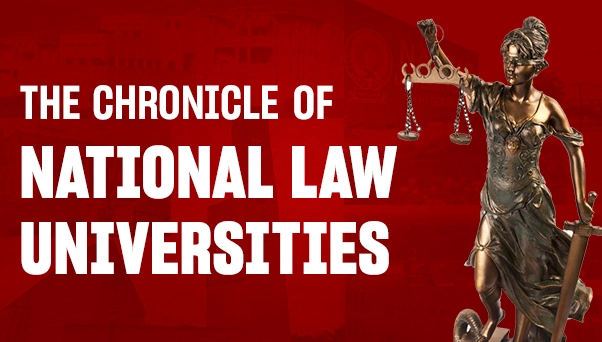Abiding by the framework of the 2nd Generation reforms of Legal Education, the first ever National Law University of India came to existence in 1987, Bangalore. After observing success with its curriculum another NLU was to be established.
The second National Law University of India came to existence in 1998, Hyderabad, 10 years since the first NLU was established.
The Chief Justice of India or the Chief Justice of the relevant High Court of the state serve as the Chancellor of the NLUs, which are institutions of excellence established under the State statutes. The only exceptions being RMLNLU, Lucknow which has The Chief Minister as a Chancellor and Dr. B.R. Ambedkar National Law University Rai, Haryana has the governor as its chancellor.
The National Law Universities were envisioned with the spirit and pattern of IIMs and IITs in mind. The NLUs have set a benchmark for legal education in the country. India is the only country to have universities which are exclusive towards the subject of law. There are 23 NLUs in our country and admit students based on their CLAT score. Only 1 NLU does not accept CLAT for admission, i.e NLU Delhi. They have their own entrance exam known as All India Law Entrance Test (AILET). Prior to this, during the years 1987 to 2007, India only had 7 NLU’s, with each NLU having its own admission test.
In 2006, a PIL was filed by a Parent of an NLU aspirant, resulting in the ruling in Varun Bhagat v Union of India whereby the Common Law Aptitude Test was formulated to enhance accessibility, certainty, and student-friendliness by eliminating the need for students to take several exams at different places.
(CWP 68 of 2006 decided on Nov 23, 2007-Varun Bhagat v. Union of India)
This allowed for a single test to be conducted for admission into the NLU’s.
Subsequently, because of the PIL ruling, a Memorandum of Understanding (MOU) was signed by 7 different NLUs, in presence of Secretary Ministry of Human Rights Department and the University Grants Commission representative, accepting the CLAT exam as the primary means of admission into the universities.
The first ever CLAT exam was in 2008. It had MCQs in a pen and paper format. This was the staple practice until 2014.
In 2015, however, the practice was halted as a new and revised Memorandum of Understanding (MOU) was set to be signed, which included seven additional NLUs of the country under the ambit of CLAT.
This marked a significant development, as the exam was also transitioned to an online format. This not only enhanced the importance of the CLAT exam for any legal aspirant but also made it more accessible by making it online.
This came to be seen as the birth of CLAT as a nationwide entrance exam. The various NLUs of the country had begun to join hands and ultimately formed the consortium of NLUs. The consortium was formulated keeping in mind the general and larger interests of its citizens and future legal aspirants.
Following this decision, in 2015, a PIL was filed by Shamnad Bashir (CWP 600 of 2015) highlighting the need for a permanent secretariat with a permanent body who shall oversee the CLAT.
Furthermore, in 2018, another CWP 551 of 2018 was filed by Disha Panchal v Union of India, issuing a direction to the MHRD to investigate the conduct of CLAT to ensure that it is being conducted in a just and fair manner.
Finally, on October 17, 2018, a permanent CLAT Secretariat was founded in Bangalore, and again in 2018, the Consortium repealed its decision to conduct the exam online and now hosts the test offline. Before this the test was conducted by each of the Universities in rotation, however, now it will be conducted by the EC of Consortium.
The Consortium came to be identified as a legal entity ever since it registered at Bangalore under the Karnataka Co-operative Society Act, 26-03-2019 comprising of 16 NLU’s. Each NLU became the founding member of the Consortium. The remaining NLUs also joined the consortium eventually except for NLU Delhi.
The Consortium consists of a total of three permanent members, i.e., National Law School of India University (NLSIU), Bangalore, National Academy of Legal Studies, and Research (NALSAR), Hyderabad, National Law Institute (NLIU), Bhopal.
The Consortium's General Council selects the President, Vice-President, and Conveners each year to carry out the CLAT exam. The Vice-Chancellor of NLSIU, Bangalore also acts as the Ex-Officio Secretary of the Consortium.
In addition to administering the CLAT exam for the graduate and post-graduate programs at participating universities, the Consortium's primary goal is to advance higher-quality legal education across all its member institutions whilst keeping it organized, fair and efficient for the legal aspirants to get access to the same.
